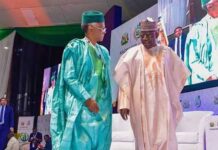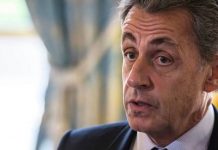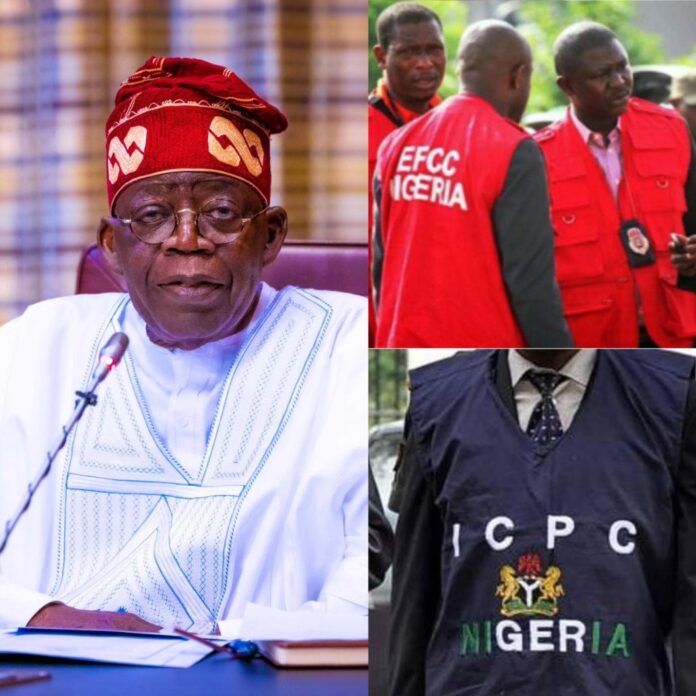Sonala Olumhense
Strictly as a calendar issue, I would never have put the name Bola Ahmed Tinubu and combating corruption in the same sentence because I could identify nothing in his track record in that direction. I am speaking about April 23, 2023, the day he took office as president.
Two months later, however, Tinubu surprisingly authored a letter appointing one Jim Obazee to high office in his administration as a Special Investigator.
I was not sure if the president knew Obazee well, an Edo man and former chief executive officer of the Financial Reporting Council of Nigeria. That evening, I put on my “Edo Nor Be Lagos” T-shirt: the white one.
“By the fundamental objective outlined in Section 15(5) of the Constitution… this administration is, today, continuing the fight against corruption by appointing you as a Special Investigator,” the president said.
It was unclear what he meant: Muhammadu Buhari, his predecessor, had offered corruption a lot of tongue-lashing but had done corruption no harm at all in his full eight years.
Not only did he spurn the rule of law, he also let two Ministers disburse federal property to whomever they pleased, with no accountability required.
Of Obazee’s assignment, President Tinubu wrote: “You are to investigate the CBN and related entities using a suitably experienced, competent and capable team and work with relevant security and anti-corruption agencies to deliver on this assignment.”
He said he wanted a comprehensive report on public wealth currently in the hands of corrupt individuals and establishments (whether private or public), and that the Special Investigator would report directly to his office, but that he expected “a weekly briefing on the progress being made.”
For eight months, the Special Investigator was hard at work, gripping the tiger by its greased tail, with snippets of his endeavours leaking periodically.
In March 2024, he abruptly submitted his final report, following which Tinubu closed the investigation days later.
Obazee’s report showed a central bank that had rotted so much that it collapsed into the sewers.
Bank Governor Godwin Emefiele, who had been a close friend and confidante of President Muhammadu Buhari in his eight years in control, appeared to have treated the bank as a target to own, rape and loot.
Among others, the investigation found Emefiele and his cohorts had illegally and without authorisation set up in such places as the US, the UK and China, up to 593 bank accounts in which he stashed Nigerian funds as if they were just pockets in his private backpack.
A disgusted Special Investigator reported, finding:
A “fraudulent cash withdrawal of $6.23 million” – about N2.9 billion at the then official exchange rate of N461 to a dollar;
543.4 million Pounds kept in fixed deposit accounts;
Manipulation of the Naira exchange rate;
Fraud in the CBN’s e-Naira project;
The Naira redesign, which threw Nigeria into political and economic distress just before the 2023 had neither been recommended by the CBN Board nor approved by Buhari.
Emefiele’s CBN printed the new bank notes at a cost of N61.5 billion, of which N31.8 billion had been paid.
Emefiele and four deputies connived to steal and balance the books of the CBN.
A fraudulent use of Ways & Means to the tune of N26.627 trillion.
In effect, Emefiele had not been running a bank; he had been running a criminal enterprise with the resources of the Nigerian people.
He had also realised that the only way to protect his massive wealth and privilege was to shoot for the presidency, so in mid-2022, he paid N100m to the APC for its expression-of-interest forms.
Obazee’s work ended rather abruptly in March 2024, with The Guardian reporting that President Tinubu may have capitulated to political intrigues, calling off his challenge to the Special Investigator to “take immediate steps to ensure the strengthening and probity of key Government Business Entities (GBEs) and block leakages in the CBN and related GBEs.”
Nonetheless, despite the abbreviated assignment, the Special Investigator was reported to have indicted 159 individuals. He recommended the prosecution of Emefiele and at least 13 others, including his deputy governors.
In Abuja and Lagos, Emefiele is currently facing a litany of legal cases involving procurement, illegal property acquisition, fraud, asset forfeiture, and forgery.
If extreme greed were a crime, it would have been one of the charges against him everywhere.
The sheer dimensions of his hunger are illustrated by the revelation that to Emefiele belonged a massive estate of 753 housing units in Abuja that the EFCC had first refused to identify.
When you think about it, the CBN governor is Nigeria’s most powerful animal, next to the president of Nigeria.
And hardly any occupier of that office in modern times has resisted its allure:
In March 2019, I reported the story of Paul Ogwuma, who had served the governments of Sani Abacha and Abdulsalami Abubakar. Private Eye, a London magazine, detailed how Ogwuma and his wife, Anna, had somehow “amassed a £33m British property empire.”
Anna owned or controlled a network of 15 British companies, and between 2002 and 2017, her companies were used for 20 separate property purchases ranging from commercial sites in the north of England to luxury apartments in west London.
As brilliant as Lamido Sanusi Lamido was, he fell into the trap of treating CBN funds like confetti, to be sprayed in any direction he pleased. I cited him in an exploration of “ethical jungles.”
Anambra State Governor Godwin Soludo, on a N12m a year salary as CBN governor, was indicted in the $462m AFC scandal in 2008. He was reported to have somehow acquired a £2.1m home in a London suburb; to have sent his children to expensive schools there, and to have acquired, for just N200m, his official residence in Abuja.
Based on temptations and allegations, therefore, Emefiele obviously is in good company.
He came, he found, he grabbed, he snatched.
Still, as I wrote in “Godwin Emefiele as smokescreen” two years ago, there is no evidence that the government intends to prosecute him fully. Tinubu did not obtain the “public wealth currently in the hands of corrupt individuals and establishments”, he suggested he wanted.
And he abruptly ended the “fight against corruption” he said he was continuing, thus confirming that it did not exist.
The Obazee report, if we were in a political prism in which true restitution and restoration were being sought, would have helped change Nigeria. The GBEs Tinubu mentioned were left unscathed.
Consider, also, that among those reportedly indicted in the Obazee report were Buhari’s Chief of Staff, Ibrahim Gambari, and Finance Minister Zainab Ahmed, for allegedly looting N17.3 trillion with Emefiele. Where are the charges?
But Tinubu, appearing to fear who might be implicated, halted the probe halfway.
What was again demonstrated is that in Nigeria, it is all about words: those who have power, position, and privilege use them for themselves, not Nigeria.
That said, keep in mind that the annual report of the EFCC to the National Assembly, another ace which has become a menace, is due on Tuesday.































































